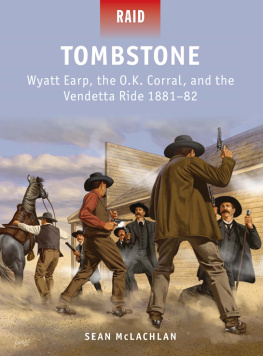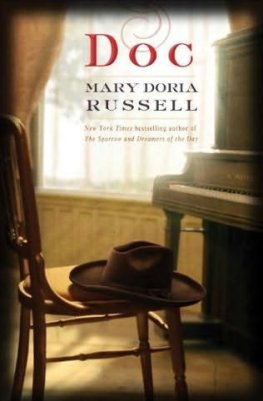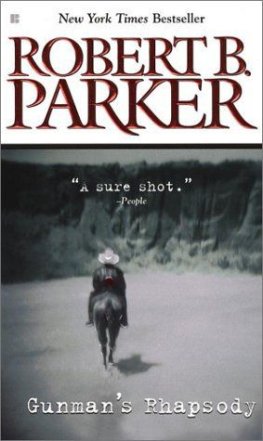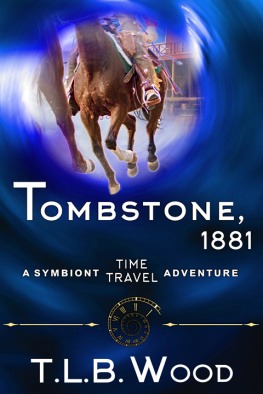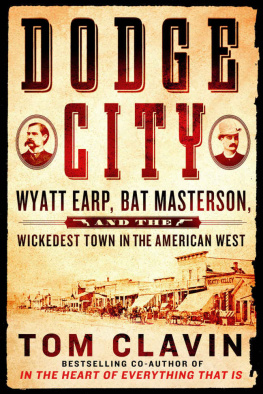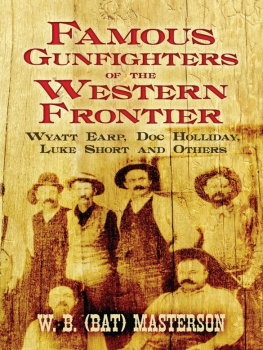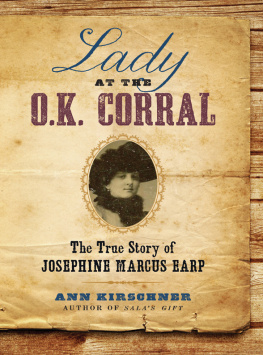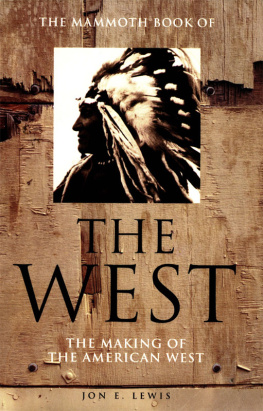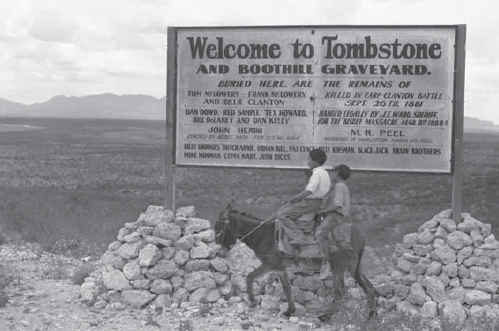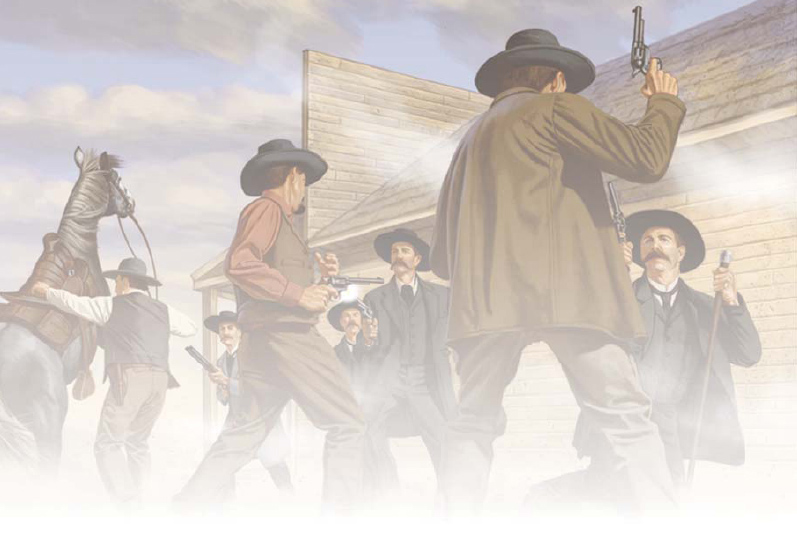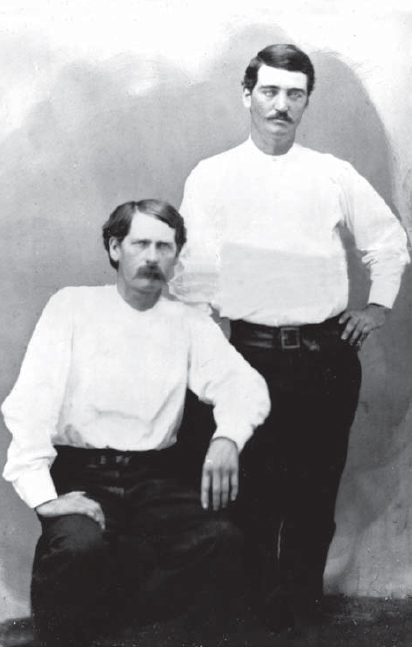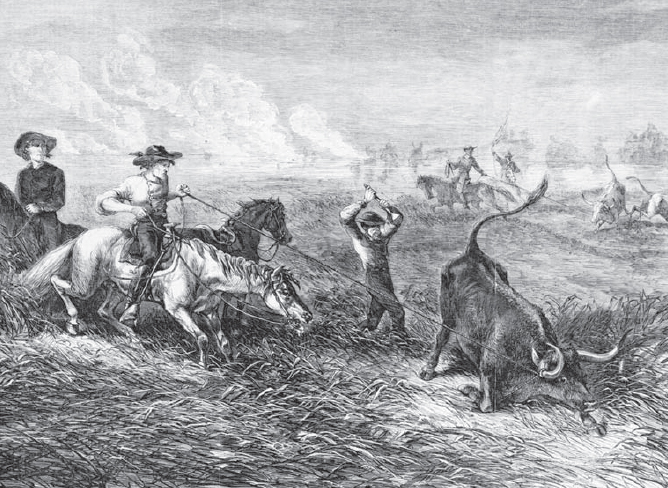TOMBSTONE
Wyatt Earp, The O.K. Corral, and the Vendetta Ride 188182
SEAN McLACHLAN
CONTENTS
INTRODUCTION
Wyatt Earp is one of the legends of the Wild West. He has been portrayed numerous times in film and countless times in fiction as everything from a squeaky-clean crime fighter to a corrupt gunslinger. As with all Wild West legends, the truth is more complex and far more interesting than the fiction.
His father, Nicholas Porter Earp, was a veteran of the war with Mexico whose brief term of service ended when he got kicked in the groin by a mule. This didnt prevent his wife getting pregnant, however, and Wyatt Berry Stapp Earp was born on March 19, 1848. Wyatt was Nicholas fourth son, after Newton, James (Jim), and Virgil. Two more, Morgan and Warren, were to follow. The family lived in various places, including Kentucky, Illinois, and Iowa.
When the Civil War broke out in 1861, Newton, James, and Virgil went off to fight for the Union. James came home with a shoulder wound that crippled one of his arms. To get away from the war, Nicholas took his family to California in 1864. The 16-year-old Wyatt distinguished himself by hunting for meat along the way and helping fight off two Indian raids against the wagon train.
Wyatt didnt have the temperament to be a farmers son, and soon he and Virgil went to seek their fortune. In 1870, Wyatt got a job as constable in Lamar, Missouri, where he handled the towns small population of drunks and criminals with efficiency and diplomacy. When he left near the end of the year, however, he was accused of embezzling $20 of town funds. For some reason the charges were dropped. Wyatt, now 22, moved to the Indian Territory, modern Oklahoma, where he was charged with stealing two horses. Once again the details are unclear, and once again he was never brought to trial. Some biographers believe he actually jumped bail. His supposed accomplice was acquitted. These two incidents placed a stain on Wyatts early days that has kept researchers arguing ever since.
Wyatt continued wandering, working various jobs on the Frontier such as hunting buffalo. He ended up in the cow town of Ellsworth, Kansas, where he became marshal after the previous one was shot dead. Although in modern American slang the term cow town is reserved for boring hick villages, the original cow towns were anything but. These were the days of the great range drives, when vast herds of cattle were moved up from Texas to the meatpacking plants of Kansas City. The railroad then shipped the meat all over the country. The cattlemen made regular stops on the long ride north and towns grew rich fleecing the men with expensive booze, crooked card games, and loose women. Needless to say, cheating large numbers of drunken Texans led to some rough incidents. Brawls were a daily occurrence and shootings frequent.
Cow towns boomed and busted as routes changed and the railway lines spread across the land. Ellsworth soon faded and Wyatt moved to the now-booming Wichita, which the St. Louis Republican described as resembling:
Wyatt Earp seated next to Bat Masterson, standing. This photograph was taken in 1876 or 1877 in Dodge City, Kansas, while Wyatt was assistant marshal and Bat was sheriff of Ford County. Wyatt would have been 28 or 29 in this shot and Bat would have been 23 or 24. (Arizona Historical Society, photo #76636)
a brevet hell after sundown. Brass bands whooping it up, harlots and hack drivers yelling and cursing; dogs yelping, pistols going off; bull-whackers cracking their whips; saloons open wide their doors, and gaily attired females thump and drum up pianos, and in dulcet tones and mocking smiles invite the boys in and the night is commenced in earnest.
In 1874, 26-year-old Wyatt Earp and his older brother Jim arrived at this brevet hell. Jim worked as a bartender and his wife Bessie as a prostitute. At that place and time, shacking up with a prostitute wasnt considered scandalous. Women were too scarce on the Frontier to be picky. Wyatt became deputy marshal and also worked as a gambler, also something that was not considered unusual or even disreputable in those days. The dusty towns that popped up on the Frontier were free zones when it came to lifestyles. In Tombstone, Arizona, there was even an openly lesbian couple. Such a thing would have been impossible back East. On the Frontier it elicited only the occasional frown.
The law had to walk a careful line in cow towns. The local economy relied on vice, yet at the same time nobody wanted violence. In cases of anything less than murder, the head drover was usually allowed to buy his boys out of jail. This kept the cattlemen happy and the money flowing in. Wyatt showed himself capable of performing this gentle balancing act on more than one occasion and earned a reputation for toughness, fairness, and an ability to defuse tense situations without resorting to gunplay. When he did use his pistols, it was usually to club some miscreant over the head rather than fill him with lead. Wyatt also had a reputation for honesty. A local paper praised him when he found a drunk passed out in the street with $500 in his pocket. Wyatt put the fellow in the drunk tank with his money intact.
This promising career came to an end when Wyatt got into an election-year fight with his bosss rival for the position of marshal. Once again details are unclear; the newspapers reported that he was fired after being arrested for disturbing the peace. Again at liberty, he got a job as assistant marshal in Dodge City, Kansas. It was during this period of his life that Wyatt met another man destined to become a Western legend a tubercular dentist named Doc Holliday.
John Henry Holliday was born in 1851 in Georgia to a family of aristocrats and slave owners. He was born with a cleft lip and partially cleft palate. This birth defect made it impossible to breastfeed him and he had to drink his mothers milk from a shot glass. Once he was old enough to undergo surgery the birth defect was fixed, but he was left with a slight speech impediment that made him a shy and withdrawn child. The family slave, Sophie, kept him company by teaching him cards, including old slave gambling games such as skinning, the predecessor to faro, which would become Hollidays favorite game and main source of income as an adult.
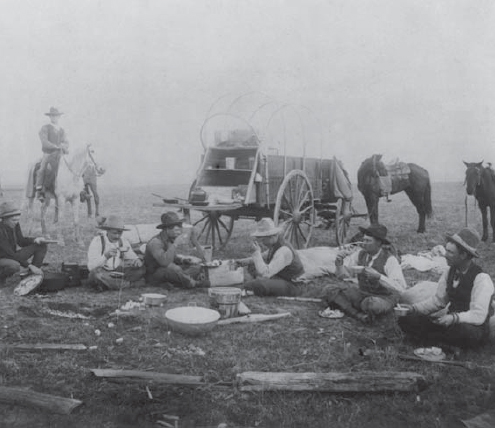
A group of cowboys taking a break at their chuck wagon. These wagons carried the cowboys food, cooking supplies, and personal effects while they were on the range. Since cowboys had to ride long distances herding and rounding up cattle, they kept a minimum of equipment on their horses. For work and travel over shorter distances, riders rarely brought a wagon along because they could rely on hospitality at local ranches and farms. On the Vendetta Ride, Wyatt Earp and his followers brought along a wagon in order to minimize their contact with local ranchers, some of whom supported the Clanton/McLaury faction. (LoC)

